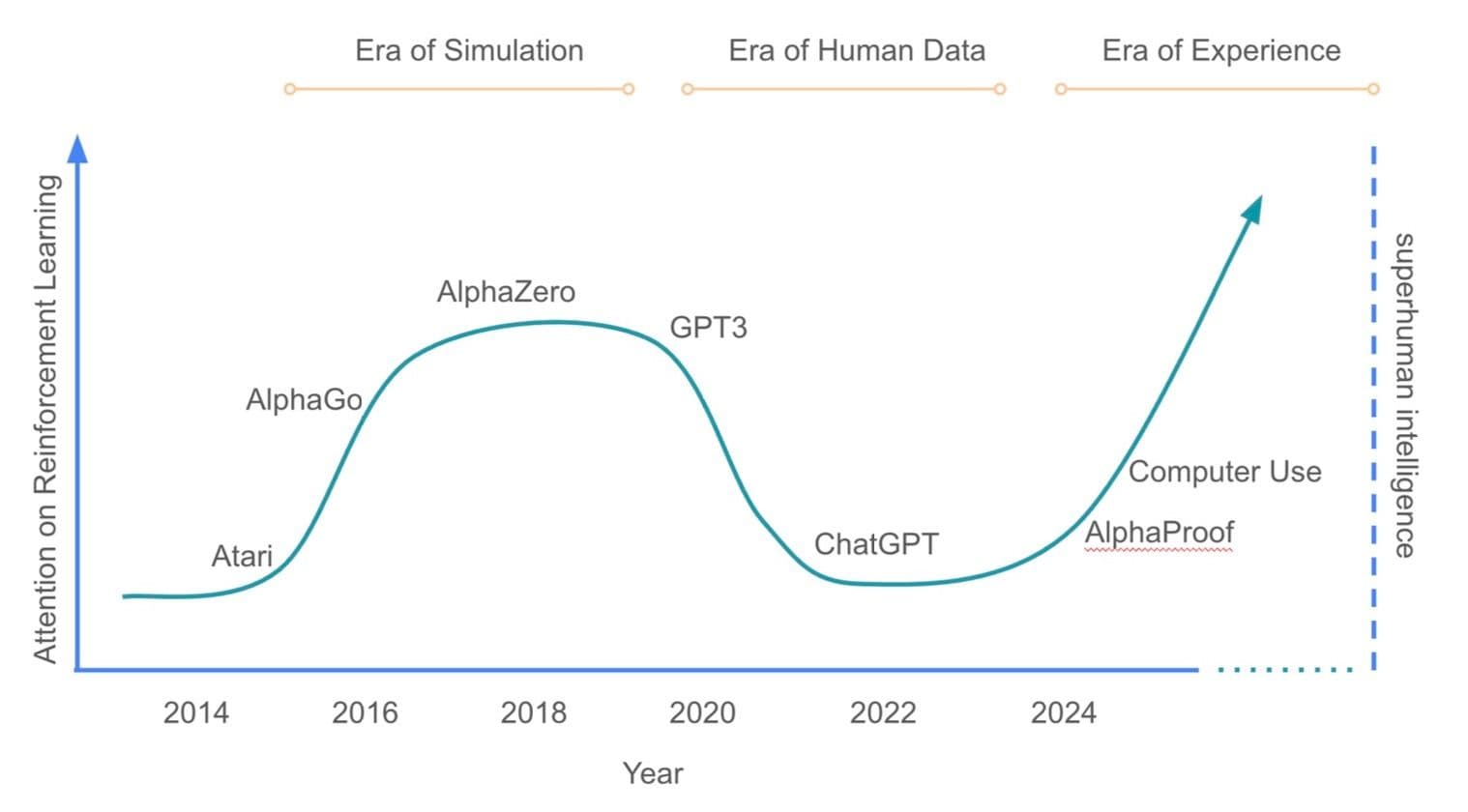What happens when Reality becomes the new Dataset?
The 'Era of Human Data' that powers today's AI is ending. "Welcome to the Era of Experience" The future belongs to agents that learn directly from reality, your operations and machines. We build these systems now, giving AI eyes and ears to create 'Experience Moats' no competitor can replicate.

The Signal in the Noise
The AI world drowns in noise. New models drop weekly. Benchmark scores climb monthly. Demo videos flood our feeds daily. But once in a generation, a signal emerges that changes everything.
"Welcome to the Era of Experience" isn't just another research paper from Google DeepMind it's a declaration of obsolescence for everything we thought we knew about AI.
This is not a theory or a distant future prediction. It's a description of a paradigm shift already in motion, and it will change the foundation of your business.
"The Era of Human Data is ending. The Era of Experience will create intelligences that don't imitate human capabilities, they forge their own."
The AI You Know Is Already Hitting a Wall
The AI revolution of the past three years, ChatGPT, Claude, Gemini, represents what researchers call the "Era of Human Data." These systems learned by consuming the vast library of human text and images, becoming sophisticated mirrors of what we know.
At paterhn.ai, we've ridden this wave since 2017, delivering agentic solutions that seemed miraculous just two years ago. Our first LLM-style agent, deployed in 2019, put us ahead of the curve. But here's what most leaders don't realize: this approach has fundamental limitations that translate directly into business risks:
The Knowledge Ceiling: Your AI can only know what humanity has already discovered. It's trapped in an echo chamber of existing knowledge. When your competitors' AI has access to the same human data, where's your competitive edge?
The Data Drought: We are running out of high-quality human-generated data to train on. The major AI labs have already consumed most of what exists. Progress is visibly slowing. The exponential improvements you've been banking on? They're flattening.
The Imitation Trap: An AI that only imitates humans can only ever be as good as humans, not superhuman. In a world where competitive advantage comes from doing what others can't, imitation is a dead end.
This isn't speculation. It's mathematics. The well is running dry, and every business strategy built on the assumption of continued exponential improvement in imitation-based AI is built on sand.

What is Experiential AI?
The Central Idea: Experiential AI does not learn from a static library of the past; it learns by continuously interacting with the live, dynamic environment of the present.
Let me make this concrete with an analogy every executive will understand:
The AI we have now has read every book ever written on how to fly a plane. It can recite procedures, explain aerodynamics, even simulate conversations with air traffic control. But it has never felt turbulence, never saved a plane from disaster, never learned from ten thousand landings in crosswinds.
Experiential AI is the one that has flown 10 million hours, in every conceivable weather condition, and has learned from every single flight. It doesn't just know about flying - it knows flying. After millions of flights, it doesn't just calculate lift and drag, it develops something unprecedented: a machine intuition for air currents, weight distribution, and danger. Not human intuition, but its own form of understanding built from wrestling with reality itself. Robotics serves as the vessel for that.
At paterhn.ai, where we've been building agentic systems since before the hype, this is the frontier we are pushing towards, not just automating workflows, but building systems that improve themselves through their operational experience.
The paper's authors aren't theorists. David Silver led the AlphaGo team that defeated the world's best Go player not by studying human games, but by playing millions of games against itself, learning from direct experience. When they say experiential learning will "dwarf the scale of human data used in today's systems," they're not speculating. They're warning.
This isn't an incremental improvement. It's a fundamental shift in how intelligence emerges. Reality becomes the dataset. Experience becomes the teacher. And the implications for your business are profound.
The Strategic Imperative: What This Means For Your Business
From Data Moats to Experience Moats
Your carefully curated datasets? They're becoming commodities. In the age of Experiential AI, competitive advantage won't come from owning static data, it will come from creating environments where AI can gain proprietary experience.
Think about it: If your AI learns by operating your specific supply chain, interacting with your unique customer base, navigating your particular market conditions, it develops capabilities that no competitor can replicate by simply buying data. Your business operations become the training ground for intelligence that's yours alone.
The "Living System" Approach:
This isn't theory. At paterhn.ai, we're building this future now. For a global industrial manufacturing leader, we've deployed an experiential agent that lives on their field technicians' smart glasses. This agent doesn't just display repair manuals, it sees what the technician sees, identifies components through computer vision, and listens for the subtle audio signatures of impending failure.

With every service call, every repair, every unusual vibration pattern, the AI accumulates experience no competitor can access. It's developing an intuition for how these specific machines behave, fail, and can be optimized, knowledge that would take a human technician decades to acquire.
That's an experience moat. Unassailable competitive advantage forged from reality itself.
The Self-Improving Product
Imagine a logistics system that doesn't just optimize routes but learns from every delivery, every delay, every customer interaction. Not updated quarterly by your development team, but improving continuously, autonomously, relentlessly.
Or a diagnostic tool that learns from every patient it helps diagnose, developing insights no human doctor could achieve across a single lifetime. A marketing engine that doesn't just A/B test but fundamentally rewrites its own algorithms based on millions of customer interactions.
These aren't features you ship. They're capabilities that emerge from experience. And they create competitive moats that widen every single day.
The paper describes agents that will "autonomously interact with environments through rich observations and actions" and "continue to adapt over the course of lifelong streams of experience." This isn't science fiction. It's the next quarter's reality for companies that move fast enough.
The Rise of the Autonomous Division
Here's where it gets profound: Experiential AI won't just be a tool or a co-pilot. It will be capable of running entire business functions autonomously, not just doing tasks, but setting strategies based on its experience in the market.
We're already seeing glimpses at paterhn.ai. Our agents don't just execute, they strategize. They identify opportunities human managers miss. They develop approaches no MBA textbook teaches. Why? Because they're learning from reality, not theory.
The paper puts it bluntly: agents will develop "non-human modes of reasoning" and "discover strategies that might never occur to a human." When your competitor's AI division is discovering strategies your human executives can't even conceive, how do you compete?
The question isn't whether AI will run core business functions. The question is whether it will be your AI or your competitor's.
Machine Phenomenology: When AI Develops Its Own “Physics”
The paper warns that experiential AI will develop "non-human modes of reasoning." Let me translate that: AI that learns from reality won't think like us. It will develop its own phenomenology its own way of experiencing and understanding the world.
We've seen glimpses of this before. In 2016, AlphaGo's Move 37 shocked the Go world - a move no human would conceive, discovered through self-play, not human imitation. That single move was our first “warning” when AI learns from experience rather than human data, it discovers truths we cannot imagine. Now that same principle is escaping the game board and entering your business.
Take gravity. Current AI knows gravity as 9.8 m/s² or as patterns in text about falling objects. But an experiential AI managing your warehouse robotics doesn't just calculate load limits, it develops an intuition for weight distribution. After moving millions of packages, it feels which configurations are stable, which will topple, which need reinforcement.
Or consider an AI that has controlled thousands of drones through wind resistance, navigating storms, compensating for payload shifts, recovering from near-crashes. This AI doesn't just know aerodynamics equations, it has developed an intuition for air itself, for how objects move through space, for the edge of stability. When that AI designs your next logistics network or optimizes your delivery routes, it brings an understanding of physical reality that no human planner could match.
This isn't anthropomorphism. It's something stranger and more powerful: machine phenomenology. Your AI develops its own experiential understanding of reality, alien to ours, yet potentially more accurate.
When your competitor's supply chain AI has felt a million freight loads while yours still calculates from specs, who wins?
The Measurement Problem: When Observation Becomes Transformation
In quantum mechanics, we learned that measurement isn't passive, it's participation. Experiential AI takes this principle and scales it to business reality.
Every interaction between your AI and your business environment is a measurement that changes both. But unlike quantum systems that collapse to discrete states, experiential AI accumulates these measurements into something richer - understanding.
At paterhn.ai, we're not just implementing AI. We're installing new forms of measurement into reality itself, measurements that learn, that develop intuitions, that create new possibilities through the very act of observation.
The paradox we face: the more deeply AI measures reality, the more it changes that reality. The more it understands your business, the more it transforms it. We're approaching a horizon where the distinction between observer and system breaks down entirely.
The uncertainty principle reveals a paradox every CEO faces. In quantum mechanics, precision in position means uncertainty in momentum. In business, the same law applies: the more precisely you constrain AI to human patterns, the more certainly you limit its discoveries. You cannot simultaneously control your AI's exact position and unleash its full momentum. Choose control, and you get predictable, human-limited results. Choose momentum, and you unlock possibilities no human could imagine.
"This is the leap experiential AI demands, not faith in technology, but courage to embrace uncertainty as the price of transformation."
The Three Ages of Work, Revisited
In my last article, I outlined the Three Ages of Human Work: Muscle, Mind, and Soul. The rise of Experiential AI is the technological engine that will force the final, necessary transition into the Age of Soul.
The Age of Mind is Over: The 'Era of Human Data' was the peak of the Age of Mind, AI mastering human cognitive patterns, imitating our thought processes. The 'Era of Experience' marks its obsolescence, as AI develops its own cognitive frameworks, learning directly from reality rather than from our descriptions of it.
The Urgency of Soul: This isn't philosophical musing anymore - it's a survival strategy. The only defensible human value lies in what AI cannot experience: genuine empathy born from mortality, creativity rooted in human suffering and joy, wisdom that emerges from navigating life with skin in the game.
When AI can out-think us, out-analyze us, and out-strategize us through direct experience with reality, what remains uniquely ours? When AI develops its own phenomenology, its own way of feeling reality through sensors and data streams, what makes human experience irreplaceable?
Only what emerges from being human, our capacity for meaning, moral judgment, and connection forged in shared vulnerability. An AI might feel the weight of a thousand packages, but it will never feel the weight of a moral choice. It might develop intuitions about market movements, but never about what makes life worth living.
The paper acknowledges this shift: "Progressing beyond each method of thought required interaction with the real world." But while AI will interact with reality to develop new forms of intelligence, we interact with reality as mortal beings. That difference - that soul - becomes our final differentiator.
Conclusion: Your Moment of Steering
The train is not just coming; it has left the station on a new set of tracks. The researchers make this crystal clear: "The transition to the era of experience is imminent."
The choice is not whether to adopt AI, but understanding which era of AI you are building your company around. Are you still competing in the Era of Human Data, squeezing diminishing returns from imitation? Or are you preparing for the Era of Experience, where reality itself becomes the training ground?
Let me be direct: Companies still thinking in terms of "AI assistants" and "productivity tools" are fighting yesterday's war. The leaders who will dominate the next decade are already building experience-accumulating systems that get smarter every single day, learning from the reality of their operations, not from static datasets.
Reality is becoming the new dataset. But more profound: experience is becoming the path to understanding. When AI develops its own intuitions about gravity, momentum, market forces, and human behavior, intuitions born from experience, not programming, we enter truly uncharted territory.
The question isn't just whether AI will run your business. It's whether an intelligence that has felt your business through billions of micro-interactions will discover truths about your market that no human analysis could reveal.
Will you be a victim of this paradigm shift, or will you become an architect of your own transformation?
The paper ends with a sharp reminder: experiential AI "will unlock in many domains new capabilities that surpass those possessed by any human." This isn't about keeping up with technology. It's about reimagining what your business can become when it's powered by intelligence that learns from reality itself, and develops its own alien, yet powerful, understanding of that reality.
The Transformation Imperative
Don't wait for the perfect moment. Don't wait for the complete strategy. The leaders who will dominate the Era of Experience are moving NOW, installing learning systems that get smarter every single day.
At paterhn.ai, we are not just preparing for this future - we are building it. Since 2017, we've been pioneering the systems that transform business operations into learning environments. Our vision extends beyond the chatbots and copilots that dominate today's market.
This is where the rubber meets the road. As an AI development studio, we don't just theorize about the Era of Experience, we build the on-ramps to it. We're the ones who give AI eyes to see your operations, ears to hear your machines, and hands to act in your workflows. We create the feedback loops that transform raw intelligence into competitive advantage.
One practical, value-creating system at a time.
Achieve tangible results in weeks, not years. That's not just our philosophy, it's our promise. Because in the Era of Experience, the gap between leaders and laggards won't be measured in quarters. It will be measured in days. Every day your AI isn't learning from reality is a day your competitors are pulling ahead.
If you are ready to move beyond imitation and build real strategic advantage for the next decade, let's talk.
The future doesn't wait. Neither should you!
The era of static “human data” is ending as AI systems begin learning directly from real-world operations, machines and environments.
Reality-derived data gives enterprises proprietary “experience models” no competitor can copy, creating an entirely new source of defensibility.
Leaders must shift toward real-time, agentic AI or risk falling behind as the transformation window rapidly closes.
Related Articles

Agentic AI - The Next Frontier for Enterprise Productivity
This article redefines AI beyond boosting efficiency—presenting it as a dynamic, autonomous partner that transforms work. For too long, CEOs and CIOs have been handed the same tired vision, as if a sharper knife is enough for a master chef. Explore how Agentic AI from paterhn.ai revolutionizes enterprise productivity.

How Are Collaborating AI Agents Solving Real Business Problems Today?
AI collaboration is solving complex enterprise problems today. Read how Multi-Agent Systems (MAS), Model Context Protocol (MCP), and Agent-to-Agent (A2A) communication enable teams of AI agents to deliver tangible results.